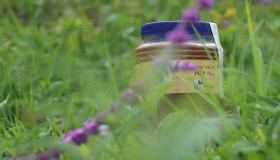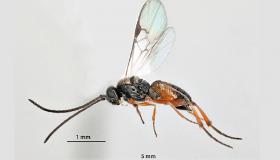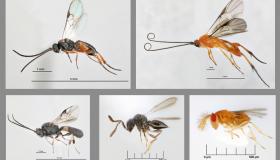Latest News
Early career researchers to receive grants from Elsevier
Two early career researchers at the International Centre of Insect Physiology and Ecology (www.icipe...
With the support of Sida, icipe and partners launch seminal One Health initiative
With the support of Sida, icipe and partners launch seminal One Health initiative
The Accelerate-...
Dr Abdou Tenkouano assumes office as the Director General of icipe
16 January 2024 | FRENCH VERSION
We are pleased to announce that Dr Abdou Tenkouano assume...
Mastercard Foundation, icipe and partners sign new agreement to scale-up their formidable youth employment model in Ethiopia – new initiative to benefit 1 million young people
Over the past eight years, the Mastercard Foundation, the International Centre of Insect P...
Norad to provide core funding to icipe, thus strengthening longstanding partnership, and boosting research and capacity development for food security in Africa
The Norwegian Agency for Development Cooperation (Norad), has signed an agreement with the Internati...
The International Centre of Insect Physiology and Ecology (icipe) announces appointment of new Director General
Dr Abdou Tenkouano, a national of Burkina Faso, has been appointed the new Director General of the I...
icipe receives grant from Carnegie Corporation of New York to support the PASET Regional Scholarship and Innovation Fund (Rsif) – the premier African-owned and managed pan-African science fund
The International Centre of Insect Physiology and Ecology (icipe), will strengthen doctoral training...
icipe e-bulletin: Volume 13, Issue No. 1, 2023
We are most pleased to present this bountiful issue of the icipe newsletter, which summarizes o...
Biological control fulfills urgent need for sustainable pest management
Range of countries, technical partners share biocontrol research, options for insect pest control...
Fall armyworm natural enemies
Cotesia icipe (Hymenoptera: Braconidae)
Fall armyworm (FAW), scientifically known as Spodoptera f...
CAP-Africa for One Health
The Combatting Arthropod Pests for better Health, Food and Climate Resilience (CAP-Africa), an initi...
icipe continues to solidify its global eminence with increasing awards and recognitions, including three recent international honours accorded to two senior staff members of the Centre
The International Centre of Insect Physiology and Ecology (icipe) is globally distinct, being the on...
Awards & Recognitions
icipe Governing Council Awards 2023
During its Annual General Meeting held on 31st October 2023, the icipe Governing Council, which consists...













